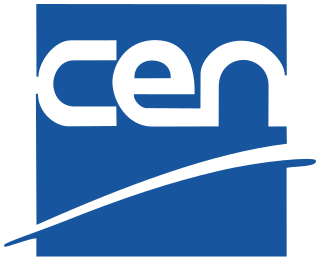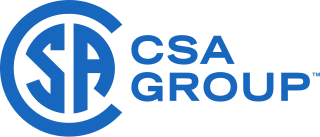
The American National Standards Institute is a private non-profit organization that oversees the development of voluntary consensus standards for products, services, processes, systems, and personnel in the United States. The organization also coordinates U.S. standards with international standards so that American products can be used worldwide.

Safety is the state of being "safe", the condition of being protected from harm or other danger. Safety can also refer to the control of recognized hazards in order to achieve an acceptable level of risk.

A hard hat is a type of helmet predominantly used in workplace environments such as industrial or construction sites to protect the head from injury due to falling objects, impact with other objects, debris, rain, and electric shock. Suspension bands inside the helmet spread the helmet's weight and the force of any impact over the top of the head. A suspension also provides space of approximately 30 mm between the helmet's shell and the wearer's head, so that if an object strikes the shell, the impact is less likely to be transmitted directly to the skull. Some helmet shells have a mid-line reinforcement ridge to improve impact resistance. The rock climbing helmet fulfills a very similar role in a different context and has a very similar design.
A standards organization, standards body, standards developing organization (SDO), or standards setting organization (SSO) is an organization whose primary function is developing, coordinating, promulgating, revising, amending, reissuing, interpreting, or otherwise contributing to the usefulness of technical standards to those who employ them. Such an organization works to create uniformity across producers, consumers, government agencies, and other relevant parties regarding terminology, product specifications, protocols, and more. Its goals could include ensuring that Company A's external hard drive works on Company B's computer, an individual's blood pressure measures the same with Company C's sphygmomanometer as it does with Company D's, or that all shirts that should not be ironed have the same icon on the label.

The European Committee for Standardization is a public standards organization whose mission is to foster the economy of the European Single Market and the wider European continent in global trading, the welfare of European citizens and the environment by providing an efficient infrastructure to interested parties for the development, maintenance and distribution of coherent sets of standards and specifications.

ASTM International, formerly known as American Society for Testing and Materials, is an international standards organization that develops and publishes voluntary consensus technical standards for a wide range of materials, products, systems, and services. Some 12,575 ASTM voluntary consensus standards operate globally. The organization's headquarters is in West Conshohocken, Pennsylvania, about 5 mi (8.0 km) northwest of Philadelphia.

The CSA Group is a standards organization which develops standards in 57 areas. CSA publishes standards in print and electronic form, and provides training and advisory services. CSA is composed of representatives from industry, government, and consumer groups.
The Sporting Arms and Ammunition Manufacturers' Institute is an association of American manufacturers of firearms, ammunition, and components. SAAMI is an accredited standards developer that publishes several American National Standards that provide safety, reliability, and interchangeability standards for commercial manufacturers of firearms, ammunition, and components. In addition, SAAMI publishes information on the safe and responsible transportation, storage, and use of those products.

On commercial products, the letters CE mean that the manufacturer or importer affirms the good's conformity with European health, safety, and environmental protection standards. It is not a quality indicator or a certification mark. The CE marking is required for goods sold in the European Economic Area (EEA), but is also found on products sold elsewhere that have been manufactured to EEA standards.
SEMI is an industry association comprising companies involved in the electronics design and manufacturing supply chain. They provide equipment, materials and services for the manufacture of semiconductors, photovoltaic panels, LED and flat panel displays, micro-electromechanical systems (MEMS), printed and flexible electronics, and related micro and nano-technologies.
GOST refers to a set of international technical standards maintained by the Euro-Asian Council for Standardization, Metrology and Certification (EASC), a regional standards organization operating under the auspices of the Commonwealth of Independent States (CIS).
IEC 61508 is an international standard published by the International Electrotechnical Commission consisting of methods on how to apply, design, deploy and maintain automatic protection systems called safety-related systems. It is titled Functional Safety of Electrical/Electronic/Programmable Electronic Safety-related Systems.

D3O is an ingredient brand specialising in advanced rate-sensitive impact protection technologies, materials and products. It comprises a portfolio of more than 30 technologies and materials including set foams, formable foams, set elastomers and formable elastomers.

An equestrian helmet is a form of protective headgear worn when riding horses. This type of helmet is specially designed to protect the rider’s head in the event of falls from a horse, especially from striking a hard object while falling or being accidentally struck in the head by a horse’s hoof.

In aviation, airworthiness is the measure of an aircraft's suitability for safe flight. Initial airworthiness is demonstrated by a certificate of airworthiness issued by the civil aviation authority in the state in which the aircraft is registered, and continuing airworthiness is achieved by performing the required maintenance actions.

The British Standards Institution (BSI) is the national standards body of the United Kingdom. BSI produces technical standards on a wide range of products and services and also supplies certification and standards-related services to businesses.
American Society of Safety Professionals (ASSP), formerly known as American Society of Safety Engineers (ASSE) until June 2018, is a global organization of more than 37,000 occupational safety and health (OSH) professional members who manage, supervise, research and consult on work-related OSH concerns in all industries, government and education. The Society's members use risk-based approaches to prevent workplace fatalities, injuries and illnesses.
ANSI/ISEA 110-2003, the American National Standard for Air-Purifying Respiratory Protective Smoke Escape Devices was established to define test criteria and approval methods for fire/smoke escape hoods published by the American National Standards Institute (ANSI). ANSI/ISEA 110 provides design guidance to Respiratory Protective Smoke Escape Devices (RPED) manufacturers in the form of a detailed set of performance requirements and testing procedures. Key sections of the standard cover certification, labeling, design, performance, conditioning and testing requirements.
The International Association of Amusement Parks and Attractions (IAAPA) represents over 6,000 amusement-industry members in more than 100 countries worldwide and operates several global attractions-industry trade shows. Its annual IAAPA Expo in Orlando, Florida, is recognized as the world's largest attractions trade show in the number of attendees and exhibitors and providing members insight into current amusement trends, laws, operations and industry methodology. IAAPA also helps to promote guest-safety and ride-safety guidelines in conjunction with ASTM International and assists its members to uphold the highest amusement-industry safety and professional standards.
SFI Foundation, Inc. (SFI), formerly known as SEMA Foundation, Inc., is a nonprofit organization which administers standard for motorsports equipment, including racing suits, roll cages and other technical components. The organisation was founded to prevent injuries among drivers, and today plays an important role in standardisation, certification and quality assurance of equipment. The FIA approves or in certain cases requires SFI-approved equipment in competitions.











